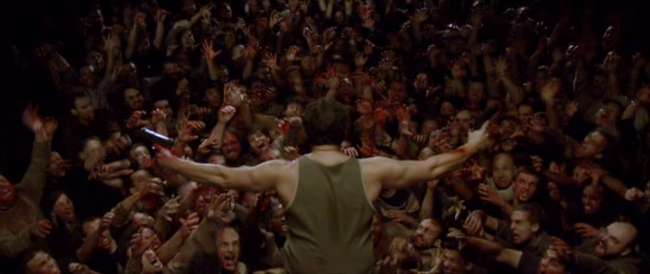
Zombie apocalypse has become the go-to genre to tell a story about the breakdown of civilisation. 2009's La Horde blends the gangster film and the zombie film and achieves both the satisfying pulp idea of "Gangsters vs. Zombies" and uses the situation to show, somewhat broadly, the breakdown of social order for which the zombies may just be a poetic coincidence.
The film begins with Ouesse (Jean-Pierre Matins), a cop, reluctantly getting talked into going after the gang who kidnapped another cop. The plan is a very off the books rescue and vengeance killing.

So from the beginning, you have cops acting like criminals. Unfortunately for them, it all goes sour and they're taken hostage by the gang headed by Adewale (Eriq Ebouaney) who coolly executes one of the cops when none of them responds to questioning.
In the middle of all this, zombies, who are of the fast moving variety, are appearing in the building and after an initial, bloody fight, the remaining few cops and gangsters realise they need to work together in order to survive.

Now the cops aren't just acting like criminals--the whole world has suddenly changed outside and the distinction between cop and gangster is completely gone. One of the injured cops even asks a gangster for some cocaine to help him with the pain of his injury.

Later they run into an older tenant, Rene (Yves Pignot), who's an army veteran from one of the French wars in Indochina who seems to be taking a sadistic delight in the memories evoked by killing zombies. He takes the blurring of civilised lines further in a reminder of just how uncivilised even the most venerable citizens of this civilisation can be.

The only person who keeps her eye on the ball is Aurore (Claude Perron), the only female character in the film, who was the lover of one of the people Adewale's gang executed. She resists agreeing to the truce and while everyone else seems to be bonding due to the shared trauma, she keeps tight hold to her vendetta. The film nicely avoids passing explicit judgement on Aurore and the audience is left to decide for themselves if it's better to recognise the common humanity of our foes or if keeping a purity of purpose prevents one from falling into aimless chaos.
Twitter Sonnet #926
An artificial cherry graced the hill.
A guiding crimson masked the water sky.
Imploding stars of indigo and will;
A maple copse collates the bold and shy.
The same visage reflects from plastic glass.
In pockets full there's candy money stocks.
You can't now barter with your Easter grass.
Much faster than his wings are ostrich socks.
Determined eyes descend along the nose.
Beloved by bakers' flour gills concede.
Unseen, the feral trees' temptation grows.
A sea of batter's better than a seed.
A flying hat was seen upturning carts.
The coach, the box, the purse; they're all Black Bart's.

No comments:
Post a Comment